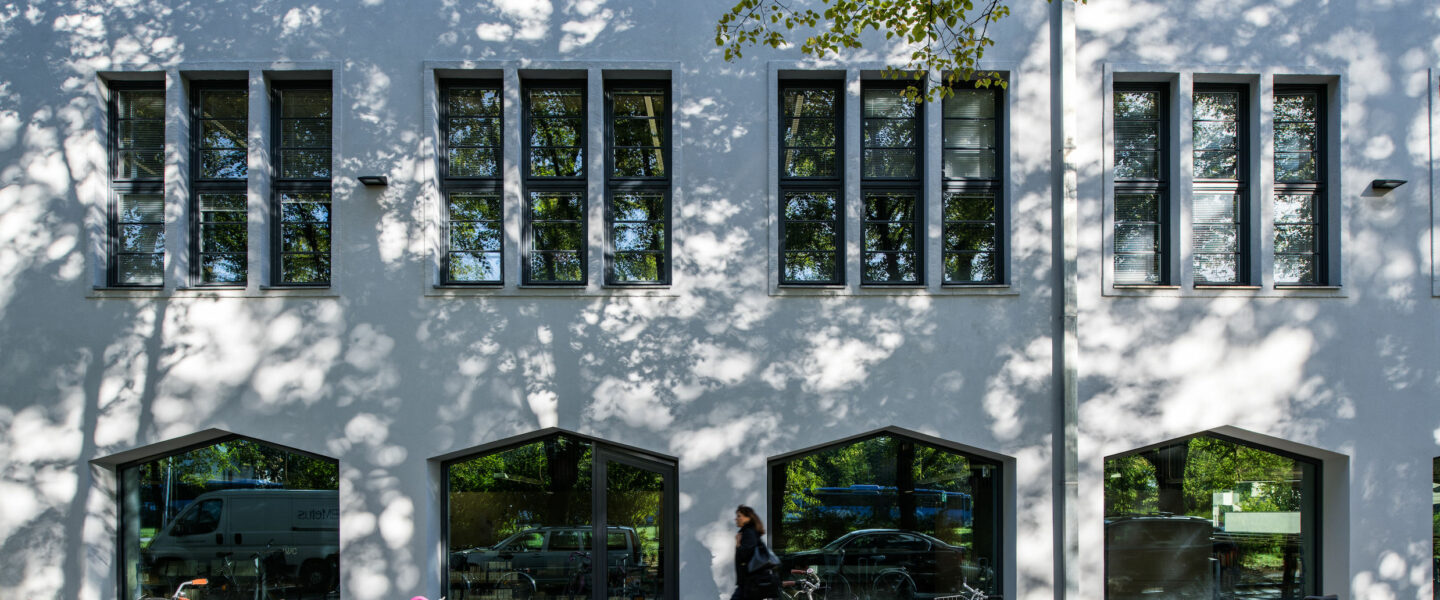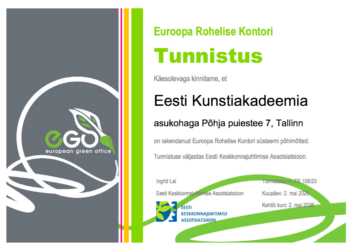
Photo: Tõnu Tunnel
The Estonian Academy of Arts was the first Estonian university to be recognized by the European Green Office.
As of May 2, 2023, the Estonian Academy of Arts has been the first university in Estonia to be officially recognized as a European Green Office. The Estonian Environmental Management Association (EKJA) issues the Green Office certificate to environmentally friendly organizations. In Estonia, 55 organizations, including only one university, have received the corresponding recognition so far.
According to Harri Moora, board member of the Estonian Environmental Management Association, “universities have been talking about creating a so-called green university for a long time. We are all the more pleased to note that the Estonian Academy of Arts has taken concrete steps and integrated the principles of a green office into its operations. For example, EKA measures its environmental footprint, which takes into account greenhouse gas emissions from the management of the university building and the transportation of employees and students. This gives a very good picture of how the university could start reducing its footprint in the future. In this way, EKA is a good example for other Estonian universities in the development of environmental activities.”
The Estonian Academy of Arts was checked for compliance with the principles of the European Green Office system by the Estonian Association for Environmental Management (EKJA) additionally on site in EKA and EKJA was also the issuer of this certificate. The prerequisite for the certificate was compliance with the requirements of the first level of the Green Office questionnaire, the existence of the Green Office coordinator, the working group and the environmental policy, i.e. environmentally friendly principles, and the approval of the management. In order to extend the certificate, the next environmental audit by EKJA will take place in the spring of 2026, by which time EKA must also meet the requirements of the next level.
Sustainable principles are widely followed at the Estonian Academy of Arts, which stands out especially in the specialities of Architecture and Design faculties of EKA, certainly in the Department of Cultural Heritage and Conservation and in the Fine Arts disciplines. Starting in the spring of 2023, one can also enroll in the new master’s program in Circular Design, which deals specifically and directly with sustainability, durability, environmentally friendly design and solving climate problems that have already arisen. Also, the Sustainable Design and Material Lab DiMa has been working at EKA for many years under the leadership of Reet Aus.
In order to receive this certificate, it was necessary, among other things, to evaluate the environmental effects caused by the organization, both on the social, economic, cultural and especially on the natural environment. It was also necessary to determine environmental metrics in order to constantly monitor the performance of sustainable goals and analyze the impact. In order to achieve environmental friendliness, an environmental action plan with corresponding goals, responsible persons and deadlines had to be drawn up. The plan is renewed every year.
“The principles of the Green Office are based on the following system: plan, implement, check, revise, improve, plan again, implement again and check again. Therefore, the implementation of the Green Office’s environmentally friendly principles is a continuous process, and anyone who is connected to the Estonian Academy of Arts can help with this. Avoiding and sorting waste if possible; avoiding and deleting digital waste; preferring already used paper on the one hand; by recycling materials; giving preference to local environmentally friendly products; using environmentally friendly means of transport; consuming as little as necessary; eating plant-based; preferring tap water to bottled drinks, setting and fulfilling sustainability-supporting goals both at work and in studies; caring for both living and non-living environments; by keeping everyone and everything, a lot can be achieved in order to preserve the living environment, without reducing the well-being of both current and future generations,” explains EKA Environmental Specialist Johanna Vahtra, who has done a lot of work to apply for the university’s Green Office certificate.
In addition to the data of Eesti Energia, Utilitas kaugküte, Tallinna Vesi, Eesti Keskkonnateenuses, Ragn-Sells, Epler & Lorenz, Tallinna Jäätmete Taasustususkeskus, Google, etc. the respondents to the 2021 and 2022 environmental sustainability surveys of the EKA and the participants of the 2023 EKA waste quantity assessment survey have also been of great help to the guide.
“It is a pleasure to note that the study of the Estonian Academy of Arts and, for example, master’s theses have a central place in environmental protection and sustainability, within the framework of all the Global Sustainable Development Goals (SDGs),” adds Vahtra.
See other holders of the Rohekontor certificate here.
More information:
Head of Communications
Solveig Jahnke
solveig.jahnke@artun.ee
Phone 5626 4949
Environmental Specialist
Johanna Vahtra
johanna.vahtra@artun.ee

